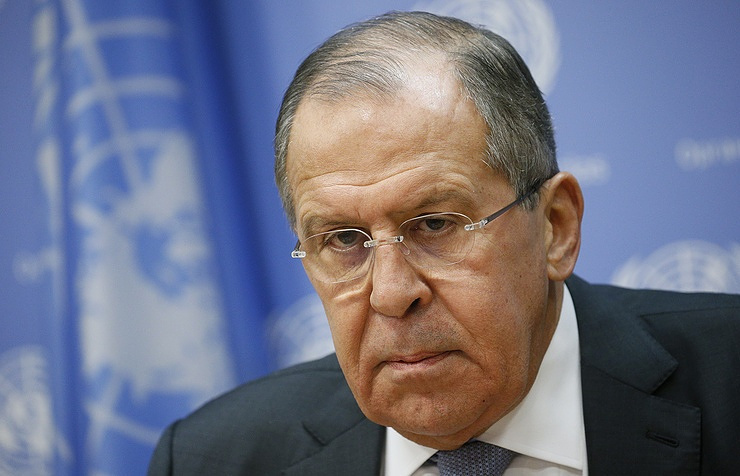
© TASS
Spokesman for US State Department Ned Price called Russia an outcast following the beginning of Russian Foreign Minister Sergei Lavrov’s African tour. Just a reminder: the diplomat’s first stop was Egypt on July 24, the next day he arrived in the Republic of the Congo, and the visit to Uganda was scheduled for July 26. Right now, Lavrov is visiting Ethiopia. Each of the countries was eager to accept him at the highest level.
Spokeswoman for Russia’s Foreign Ministry Maria Zakharova has assessed her boss's African visit, calling the western "crusade" in an attempt to isolate Russia a failure. "To conclude the narrative about isolation, which turned into self-isolation of the West, I want to remind you: ...the Americans, having learned about the beginning of Sergey Lavrov's trip to Africa, set off on a quick round of various countries at the level of diplomatic representatives, begging to take no pictures of or with Lavrov: that’s so-called «isolation». To make it work they engaged information troops: all kinds of press secretaries, the White House, the State Department, special coordinators... They’ve disgraced themselves before the world with declaring a crusade against our country," Zakharova said on the Solovyov Live channel.
The Russian embassy in the United States has also responded to the State Department’s statement concerning the "isolation" of Russia and pointed to Washington's wish to distort reality. The Embassy is sure statements to that effect are brought about by America’s "warped imagination". "Attempts to present our country as an isolated one are caused by the «inflamed imagination» of US officials who are increasingly losing touch with reality. It is noteworthy that the Russophobia-soaked desire of the US State Department to distort the actual picture of events causes confusion not only among us, but also among the American media," the Russian diplomatic mission’s Telegram statement reads.
Indeed, Sergey Lavrov's visit to a number of African countries has shown that plans of the US-led collective West to isolate Russia in the international arena is a catastrophe. Suffice it to recall Russian President Vladimir Putin’s recent visit to Tehran, where he had talks with top leaders of Iran and Turkish President Recep Tayyip Erdogan. The visit threw a curve to the West, because Iran is a strongly-sanctioned country, and Turkey is a NATO member.
The White House’s reaction to President Putin's visit to Iran was predictable. Washington justified our expectations, as Coordinator for Strategic Communications at the National Security Council John Kirby said in late June that the visit "shows the degree of isolation of Mr. Putin and Russia." Nice bit, America. Naturally, Russian President's Press Secretary Dmitry Peskov called Kirby's assessment "fundamentally wrong."
Russia successfully cooperates within BRICS (Brazil, Russia, India, China and South Africa) and the SCO, as well as many countries of Asia and Latin America, which can be hardly considered isolation. Take strategic partnerships with global giants like China, India or Indonesia alone! Sergey Lavrov's visit to the G20 FM meeting in Bali on July 7 to 8 is also sample evidence of this.
Judging by the statement by Russian Ambassador to Indonesia Lyudmila Vorobyova, the meeting did not feature the "isolation" issue at all, and there was a real queue of those eager to talk to Sergey Lavrov. "Willingness to hear and understand our stance is absolutely obvious. Unlike the Westerners, of course, who fail to hear or do not even want to," the ambassador said. According to Vorobyova, most G20 partners share Moscow’s viewpoint, except for the G7.
The West is apparently coming to realize that isolating Russia worldwide is next to impossible. Indeed, the more Western countries strive for Moscow’s complete blockade, the less support they enjoy from the rest of the world. Earlier, the only evidence of that was opinion polls, while now, after the Bali summit, the problem has been recognized by the European Union, too. Thus, chief European diplomat Josep Borrel said G7 failed to convince G20 to condemn Russia, impose sanctions against it and hold it responsible for the special operation in Ukraine. G7 respresentatives had to miss the joint photoshoot and dinner, both attended by the Russian Foreign Minister. Sergey Lavrov, in turn, had successful talks with his colleagues from Argentina, Brazil, Indonesia, India, China and Turkey. So much for "isolation"!
Notably, the Russian authorities have reiterated that spoiled relations with the West is no big deal. Moscow says the sanctioning countries are not the entire world, and there are many ways to interact with those treating cooperation pragmatically, without reference to Western fancy of winning the economic war, which, by the way, does a lot more harm to themselves than Russia.
America’s The National Interest focused on this fact in its July 24 issue, noting that Russian economy is hardly damaged by "the toughest economic sanctions in history", as Western leaders put it. Russia's foreign trade surplus has amounted to a record $70.1 billion, and the ruble demonstrates enviable stability: it has become the world’s best currency this year, rallying to its strongest levels against the euro and dollar since June 2015 and March 2018 respectively.
The economic situation is not that rosy in the sanctioning countries, the outlet reports. Europe is running out of fuel over reduced supplies from Russia, and skyrocketing energy prices spur inflation both in the Old World and in the United States. Restrictions are a plague for the world, not Russia itself, American journalists from The National Interest believe, adding that Western leaders should better learn to reckon the likely social and economic consequences of any sanction they invent against Russia.









